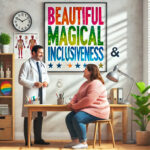Keep Quiet and Carry On: Life with PCOS

Keep Quiet and Carry On: Life with PCOS
It’s 1995 and 14-year-old me cannot take the acne anymore. I’ve tried all the usual teenage skincare routines, but nothing’s worked. Self-esteem is low. At a loss, Mum takes me to our GP, and he puts me on minocycline. My acne doesn’t disappear, but is reduced, so I carry on.
To 1998, and I’ve been pulled aside by my after school choir teachers. Both look at me with evident concern.
“We overheard what you said [to your friend]. Do we need to talk about it?”
“No, of course not,” I tell the truth, duly embarrassed. “It’s nothing to worry about. I just don’t really get hungry.”
It was 4pm and, so far, I’d consumed a cup of coffee and an apple for the day.
To the women who ran choir, this might have indicated certain issues emerging or dominating my life, but I’m fairly sure they not would have realized what was going on.
Nobody did, least of all me.
Carry on to 2004. I have a stable, challenging job with good people, despite being known for having a “bit of a short fuse”. I met a great guy about six months earlier, and we are moving into the same apartment. Life is generally fun, full of dinners, movies and the excitement of new love.
Then, my period stops. Pregnancy test is negative. I carry on, wondering at my good fortune (because really, who likes that time of month?). The next period skips as well. Multiple pregnancy tests are bought and taken. All negative.
I head to the doctor.
My GP is a woman who I’ve trusted for about four years. She explains pregnancy tests aren’t always accurate and sends me for a blood test – which also returns negative for the baby hormone. But my GP tests for a few other hormone levels in my blood, and testosterone comes back too high.
This is one of several markers for a disorder called Polycystic Ovary Syndrome, or PCOS.
What is PCOS?
Polycystic ovary syndrome (PCOS) is a health problem that affects one in 10 women of childbearing age. Women with PCOS have a hormonal imbalance and metabolism problems that may affect their overall health and appearance. PCOS is also a common and treatable cause of infertility.
I felt confused.
My GP sent me for an (invasive and embarrassing) ultrasound, which confirmed that there were more than 12 cysts on my right ovary, and my left was elongated out of shape. PCOS was confirmed, and my GP put me on the only “solution” in 2004, the birth control pill.
“But the pill always makes me feel terrible,” I explain.
“I’ll put you on the lowest dosage possible,” she insists.
Within weeks, as with other times on the pill, I feel depressed, verging on suicidal. I return to my GP. She puts me on a “mild antidepressant” to counter the effects of the birth control pill, insisting I remain on the latter, as it is the only treatment for PCOS.
“There has to be another option,” I beg her.
She shrugs, apologetic. “There isn’t.”
The antidepressant doesn’t work. I’m angrier, more prone to tears than ever, and the voices in my head insist death would be a better option, really. The voices are separate from healthy me; I know this isn’t me – because I’ve experienced this every other time that I’ve taken the pill – but knowing doesn’t stop the effects.
I wean myself off the anti-depressant, throw away my birth control pills and let myself recover from the whole experience.
But my doctor has said there is no cure. No solution. I have PCOS and if I can’t be on the birth control pill to regulate my periods, I just have to live with whatever PCOS throws at me.
Don’t worry about it until you want to have a baby
The attitude of many, but not all practitioners, is to ignore the symptoms until you want to conceive – as though your personal wellbeing, self-confidence and happiness aren’t worthy of concern otherwise.
But to me, PCOS was more than a thing that affected when or how I would have a baby – it made it easy to gain weight, impossible to lose it. It made hair grow in places it should not and shed in places it should stay. It meant I didn’t get hungry, so I didn’t look after myself from a nutritional perspective when I got busy and forgot to eat.
So, what is PCOS?
I want to give fair warning: I am neither a nutritionist nor a medical practitioner. But I was so confused and dissatisfied by what I was told about PCOS by both traditional and non-traditional practitioners that I went on a self-learning journey to try to figure it out (which, in hindsight, might be what most practitioners want; for a person to become invested in the “ins and outs” of their personal disorder).
PCOS isn’t just about the ovaries and fertility. PCOS is a whole endocrine system disorder, and the skipped periods are just the corner of a much bigger picture.
Your endocrine system manages all your body’s hormones, not just those related to sex organs, and includes:
- The hypothalamus
- Pituitary gland
- Pineal gland
- Thyroid gland
- Adrenal glands
- Pancreas
- Ovaries in women
- Testis in men.
With PCOS, your body gets confused when it’s time to create hormones, so while it sends a hormone when requested by some sector of your body, it often sends the wrong one, or too much or too little of the right one. This explained why I had skipped periods (without the right hormone during ovulation, the egg won’t release and a cyst forms instead), why I did not feel hungry (my pancreas created too much insulin when I did eat), why I could not lose weight (without proper thyroid function, the metabolism slows, making weight loss extremely difficult), not to mention the chemical soup of misplaced emotions I would feel at random times.
What causes PCOS?
PCOS is a genetic disorder. The latest research suggests Polycystic Ovary Syndrome is passed down on the mother’s side while you’re in the womb due to an excess of anti-Müllerian hormone, whatever that is. So, you’re carrying the genetic predisposition for PCOS from the word go.
What triggers PCOS is open for debate. For some, it’s the hormonal shifts of puberty, for others it’s stress, for others it’s weight gain, for others it’s inflammation… to be honest, you could probably look the wrong way at a stray cat and trigger your PCOS. There is no single cause for triggering PCOS.
I have no idea what triggered mine. Sure, now I might attribute my excessive acne and lack of hunger when I was a teenager to PCOS, but I had no idea what to ask, or what to tell my doctor, because those symptoms were indicative of many other normal things that non-PCOS teenagers experience. I consider myself one of the lucky women who was diagnosed relatively quickly once my periods started skipping. From the initial visit to my GP to diagnosis probably took three months in total, and I was conscious of PCOS playing a part in my life from the age of 23.
A PCOS diagnosis takes an average of two years and consultations with three doctors.
Why does it take so long to be diagnosed with PCOS?
Talk to a few women who have been diagnosed with PCOS and you will notice it presents in many different ways, and those symptoms that do present, vary in severity.
PCOS Symptoms include (via https://www.pcosaa.org/pcos-symptoms):
- irregular or missed periods (as a result of not ovulating) – but some don’t experience this;
- cysts on the ovaries – but some don’t develop beyond the number considered normal;
- weight gain (about half, but some can’t put on weight at all);
- fatigue (but some have too much energy);
- unwanted hair growth (hirsutism) – on the face, arms, back, chest, thumbs, toes, and abdomen;
- thinning hair on the head, but some don’t experience this at all;
- infertility. PCOS is a leading cause of female infertility. But some don’t have a problem with getting pregnant (I have a son and did not go on fertility treatments);
- acne, skin tags and darkened patches of skin. But SOME DON’T;
- mood swings, depression, loss of sex drive, anxiety – but some report the opposite;
- pelvic pain may occur with periods, along with heavy bleeding. May also occur when a woman isn’t bleeding. So. Like. Just pelvic pain, at any time, really;
- headaches;
- sleep problems, insomnia or poor sleep, sleep apnea – but some don’t get this at all.
Diagnosis also is tricky because we are good at simply carrying on with our lives through the string of symptoms. We are too good at not talking about our bodies; we’d rather hide the embarrassing symptoms and hope nobody brings it up, or notices.
It’s when all those symptoms stack up that your quality of life degrades.
By the time I decided to address my PCOS, the symptoms were overwhelming
In 2016, at the age of 35, two years after my son was born, I hated how I looked and felt. I hated that there was no cure for PCOS and I had to accept I would always live like this; overweight, tired, constantly hiding and removing the hair where it shouldn’t be, easily aggravated – and the supposedly ‘normal’ means of dealing with such matters, that worked for everyone else, didn’t work for me. I hated my body for not working properly.
I joined a Facebook group, PCOS Worldwide, which has unfortunately been archived since 2018, but prior to closing had 14K members). I was astonished and appalled at the sheer number of women posting stories similar to mine; of isolation, feelings of shame, that their doctor and family didn’t listen to them, that their doctor and family blamed them:
“You have PCOS because you are overweight.”
“Oh my god you have facial hair, are you even a woman?”
“I have no sex drive; how do I stay with my boyfriend?”
“I’m not losing weight; everyone thinks I’m lazy / says I’m not trying hard enough!?”
Every 20 minutes or so there seemed to be a post from someone begging for help, begging to be heard, asking for any ideas on how to combat this symptom or that, after advice because nobody outside of this group on the internet would acknowledge they were in pain or upset, or they were too embarrassed to talk about the symptoms in the offline world. They were proof that “don’t worry about it until you want to get pregnant” was not good enough.
Because it isn’t good enough
The more I read, the more desperate and angrier I became. I wanted to prove that no matter what I did, no matter what lifestyle changes I made, there was nothing I could do to ease the symptoms. I wanted to prove that PCOS had broken my body.
So, between raising my then two-year-old and maintaining my freelance business, I researched, driven by frustration and spite. I cooked for three hours a day, maintaining a low-GI, high-protein and preservative-free lifestyle (a challenge for a vegetarian), giving up any carbohydrate that had high levels of glucose (like bread, pasta and rice – former staples), to support my pancreas. I gave up coffee to help my thyroid, and drank litres of spearmint tea a day, to help cut the extra androgens my stupid body was creating. I took oodles of high-strength supplements to support my whole endocrine system, not only my ovaries, because I was MORE than just a baby-making factory.
The first two months were hell; I felt awful and was convinced this effort was for nothing. I lost 2kg (about 4lbs) in the first month, to my devastation. Two measly kilograms, after ALL that work and money and time and effort.
I lost 2kg in the second month, and that amount was still, to my mind, pathetic.
I lost a further 2kg in the third month. By then, unbeknownst to me, the sugar was out of my system, and the supplements had started doing their work on my frame of mind, by supporting my endocrine system, encouraging it to create the right hormone at the right time. 6kg (13lb) was, I had to acknowledge, not nothing.
I carried on in this new way for 16 months, steadily dropping 2kg a month. I lost 24kg (53lbs) and achieved my ideal BMI for my height, through nothing more than diet and supplements (no exercise regime to speak of; I didn’t have time). I became a more patient person, and I felt I was a better mother. My skin was clear. Best of all I had SO. MUCH. ENERGY.
My body wasn’t broken, it was just different, and I had taken years to figure out what conditions it best operated under.
But that doesn’t mean the same series of life changes will work in the same way for other women with PCOS, because it presents differently in everybody, and each body has different needs.
Where to start?
If you think you might have PCOS, the first person to see is your doctor. To be diagnosed with PCOS, you will have two of three indicators confirmed: high androgen (testosterone) levels, irregular periods, and cysts in the ovaries. A blood test will confirm the former, and a pelvic exam will confirm the latter.
These may not be the only symptoms you experience, but they will be what your doctor needs to confirm, to diagnose you.
Where to find support?
If you are struggling with the symptoms of PCOS, the first thing you need to tell yourself is that this is not your fault. PCOS wasn’t some booby prize awarded to you for something you did or didn’t do. You’ve had it since birth.
As you can probably tell from my rambling tale, I didn’t find a whole lot of support through my general practitioner (I’ll be honest, I felt betrayed by her), as did many of the women whose stories I read in the PCOS support group. Not everybody has this experience, so approach your doctor with an open mind, and if you receive information that doesn’t sit right with you, keep trying until you get some answers or options – until you feel you have been heard.
There is no quick fix, but the mountain is not insurmountable. Depending on the impact and severity of your symptoms, you may choose to alter your dietary lifestyle, you may choose to take metformin (a common treatment for Type 2 Diabetes, prescribed to PCOS women to assist with insulin resistance), you may decide to go on birth control, you may decide to enter into a dietary supplement regime.
Despite feeling like your body has fundamentally betrayed you as a woman, you always have a choice in how you combat the symptoms, even if it takes years to locate the right mix for your body.
I highly recommend you join a PCOS Group on Facebook, even if you never post and only read other women’s stories, because only other women with PCOS will truly understand the sheer challenge of everything you’re coping with:
- https://www.facebook.com/PCOSAwarenessStore/
- https://www.facebook.com/groups/pcosgrouphelp/
- https://www.facebook.com/groups/PCOSWWAustralia/
While having PCOS has taught me to listen to and work at what is right for my own body, and to accept it will not react in the way non-PCOS bodies do, it helps to not feel entirely alone on the journey.





